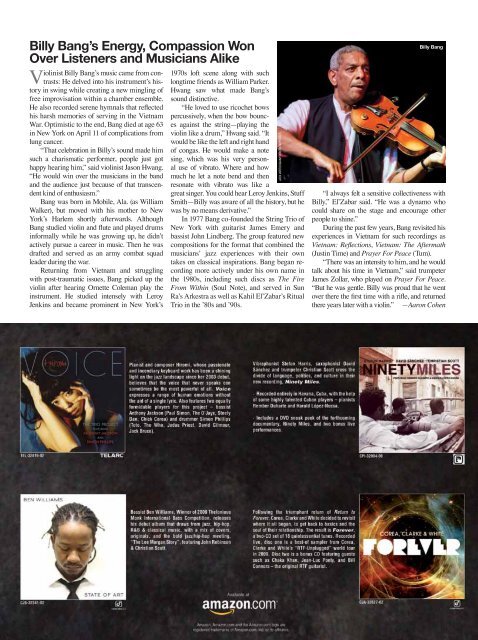Wessell Anderson Gerry Hemingway Dave Stryker John ... - Downbeat
Wessell Anderson Gerry Hemingway Dave Stryker John ... - Downbeat
Wessell Anderson Gerry Hemingway Dave Stryker John ... - Downbeat
You also want an ePaper? Increase the reach of your titles
YUMPU automatically turns print PDFs into web optimized ePapers that Google loves.
Billy Bang’s Energy, compassion Won<br />
over listeners and Musicians Alike<br />
Violinist Billy Bang’s music came from contrasts:<br />
He delved into his instrument’s history<br />
in swing while creating a new mingling of<br />
free improvisation within a chamber ensemble.<br />
He also recorded serene hymnals that reflected<br />
his harsh memories of serving in the Vietnam<br />
War. Optimistic to the end, Bang died at age 63<br />
in New York on April 11 of complications from<br />
lung cancer.<br />
“That celebration in Billy’s sound made him<br />
such a charismatic performer, people just got<br />
happy hearing him,” said violinist Jason Hwang.<br />
“He would win over the musicians in the band<br />
and the audience just because of that transcendent<br />
kind of enthusiasm.”<br />
Bang was born in Mobile, Ala. (as William<br />
Walker), but moved with his mother to New<br />
York’s Harlem shortly afterwards. Although<br />
Bang studied violin and flute and played drums<br />
informally while he was growing up, he didn’t<br />
actively pursue a career in music. Then he was<br />
drafted and served as an army combat squad<br />
leader during the war.<br />
Returning from Vietnam and struggling<br />
with post-traumatic issues, Bang picked up the<br />
violin after hearing Ornette Coleman play the<br />
instrument. He studied intensely with Leroy<br />
Jenkins and became prominent in New York’s<br />
1970s loft scene along with such<br />
longtime friends as William Parker.<br />
Hwang saw what made Bang’s<br />
sound distinctive.<br />
“He loved to use ricochet bows<br />
percussively, when the bow bounces<br />
against the string—playing the<br />
violin like a drum,” Hwang said. “It<br />
would be like the left and right hand<br />
of congas. He would make a note<br />
sing, which was his very personal<br />
use of vibrato. Where and how<br />
much he let a note bend and then<br />
resonate with vibrato was like a<br />
great singer. You could hear Leroy Jenkins, Stuff<br />
Smith—Billy was aware of all the history, but he<br />
was by no means derivative.”<br />
In 1977 Bang co-founded the String Trio of<br />
New York with guitarist James Emery and<br />
bassist <strong>John</strong> Lindberg. The group featured new<br />
compositions for the format that combined the<br />
musicians’ jazz experiences with their own<br />
takes on classical inspirations. Bang began recording<br />
more actively under his own name in<br />
the 1980s, including such discs as The Fire<br />
From Within (Soul Note), and served in Sun<br />
Ra’s Arkestra as well as Kahil El’Zabar’s Ritual<br />
Trio in the ’80s and ’90s.<br />
JacK vartoogian/frontrow photos<br />
Billy Bang<br />
“I always felt a sensitive collectiveness with<br />
Billy,” El’Zabar said. “He was a dynamo who<br />
could share on the stage and encourage other<br />
people to shine.”<br />
During the past few years, Bang revisited his<br />
experiences in Vietnam for such recordings as<br />
Vietnam: Reflections, Vietnam: The Aftermath<br />
(Justin Time) and Prayer For Peace (Tum).<br />
“There was an intensity to him, and he would<br />
talk about his time in Vietnam,” said trumpeter<br />
James Zollar, who played on Prayer For Peace.<br />
“But he was gentle. Billy was proud that he went<br />
over there the first time with a rifle, and returned<br />
there years later with a violin.” —Aaron Cohen<br />
JULY 2011 DOWNBEAT 17

















